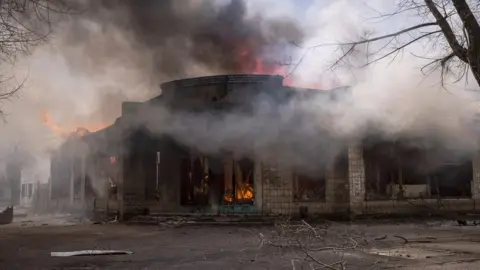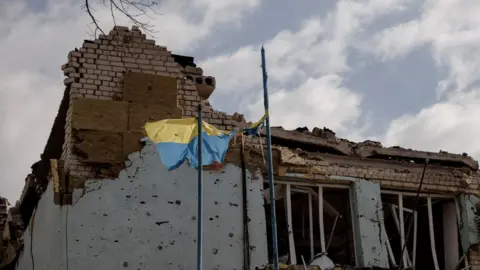Ukraine war: Kyiv's successes do not mean imminent victory
 Getty Images
Getty ImagesThe course of the war in Ukraine has taken many by surprise, not least the Russian leadership. But as our world affairs editor John Simpson reports from the western city of Lviv, Ukraine's politicians are cautioning against too much optimism.
Some commentators in the West seem to think the Ukrainian war is pretty much won. One American military historian says he knows of no parallel to a major power like Russia invading a country at the time of its choosing and failing so utterly.
Here in Ukraine, though, people aren't nearly so confident. They think they're in for a long slog, which will end either with a clear defeat for Russia, or - alternatively - when President Vladimir Putin feels he has gained enough Ukrainian territory to be able to claim victory.
Precisely because they believe they are in for a long and difficult war, Ukrainian politicians from President Volodymyr Zelensky down are getting angry with what Ukraine sees as Nato's pathetically slow delivery of weapons supplies.
The governor of Lviv Maksym Kozytsky, a close ally of the president, says, "In my opinion, from the West there is a policy of double standards and cowardice. It's cowardice not to call a spade a spade. And cowardice not to take any position. And cowardice leads to tragedies."
Is Nato doing enough?
There is a persistent feeling here that Nato is dragging its feet.
Ukrainians think the West is worried that if it provides too many high-quality weapons, President Putin will use this as a pretext to attack Nato territory - and a much wider and far deadlier war could break out.
 Reuters
ReutersWestern officials here say this isn't true, and they're puzzled by it.
The US chargé d'affaires to Ukraine, Kristina Kvien - currently based in Poland - insists that the US and its allies are pumping weaponry into Ukraine as fast as they can. But she accepts that the Kyiv government will always want more and quicker arms deliveries.
Tanks are now starting to arrive from the Czech Republic - though one lesson of this war so far has been that tanks are horribly vulnerable to drones and shoulder-held missiles. The US is considering providing anti-ship weapons to counter the bombardment of towns and cities along the coast from Odesa eastwards.
Ukraine's Defence Minister Oleksii Reznikov is calling for heavy weapons to counter the Russian forces switching from the Kyiv front to Donbas in the east. This new stage in the fighting will be a lot more challenging for the Ukrainians, whose supply lines will be longer than they were around the capital.
Privately, senior politicians here are worried Ukraine will lose further territory to Russia. And, like the Nato Secretary-General Jens Stoltenberg, they think this war could go on for a long time.
In the meantime the world will presumably see more and more of the terrible destruction which Russian troops have visited on towns and villages around Kyiv.
Experienced correspondents like the BBC's Jeremy Bowen say the devastation in the small town of Borodyanka is worse for its size than Irpin and Bucha.
The expectation is that many more cases of torture and murder will come to light in the days to come.
The evidence of war crimes has made Ukraine even more determined to fight back against the invaders. It is also helping to stiffen the resolve of Nato countries whose populations are overwhelmingly against the Russian invasion.
Ukrainian politicians like Mr Zelensky and his colleagues have probably realised that by accusing the West of dragging its feet, they'll encourage people to demand that their governments should do even more to help Ukraine.
No victory parades, just yet
Meanwhile the sanctions which are already being imposed are estimated to set the Russian economy back 15 years. And there are certainly plenty more sanctions to come.
"This has been a textbook example of how not to fight a war," says one well-known British military analyst. That is surely true.
On 26 February, only two days after the invasion began, the Russian state-owned news agency Ria Novosti put out a story celebrating the successful return of Ukraine to the Russian motherland. The article was hurriedly withdrawn, since even by then the war was obviously not going well.
The other day, Dmitry Medvedev, who kept the presidential seat warm for Vladimir Putin for a four-year term between 2008 and 2012, announced that Russia was building a power base that would spread from Vladivostok in the Russian far east to Portugal in the west.
Still, just because that kind of boasting sounds ludicrously wide of the mark after six weeks of war, it doesn't mean that Ukraine is starting to plan any victory parades.
We could have a long way to go yet.

War in Ukraine: More coverage
- LIVE: Latest updates from Ukraine
- FACT CHECKING: Fact-checking Russian claims about Bucha killings
- WAR CRIMES: Could Putin be prosecuted?
- WATCH: Ambulance crew on the front line
- READ MORE: Full coverage of the crisis

John Simpson's programme, Unspun World, is broadcast on BBC2 on Wednesdays, the BBC News channel on Saturdays, and BBC World News on Sundays.
